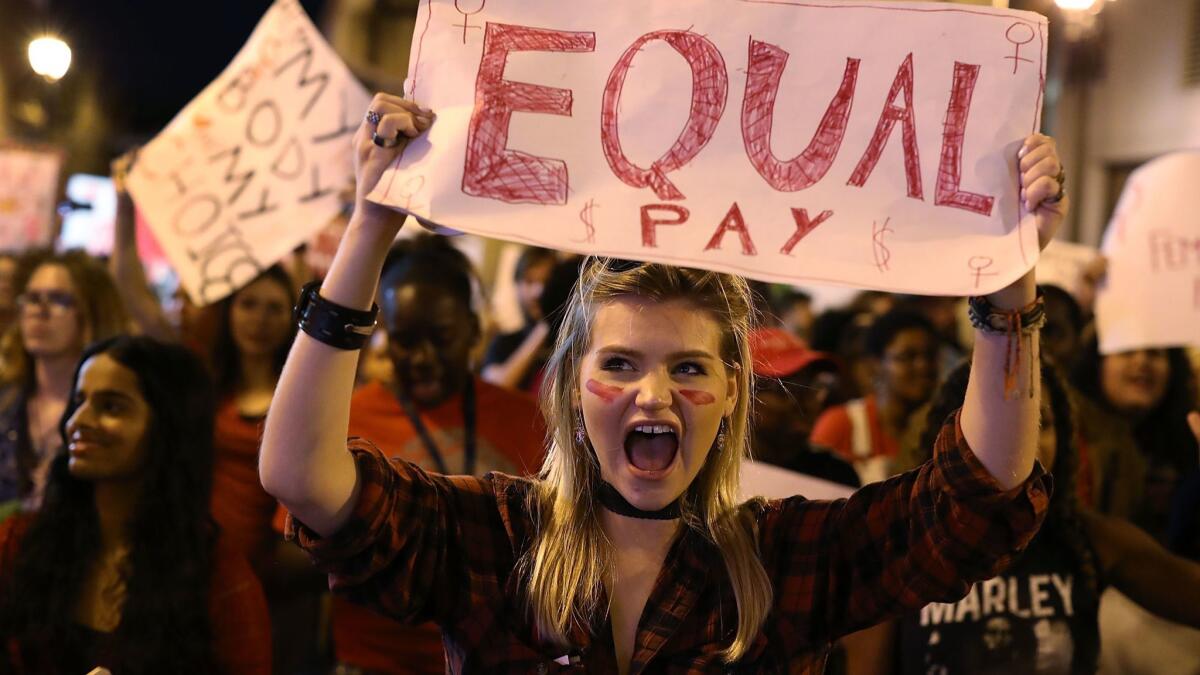Sexual harassment helps explain why women get paid less

American women don’t earn as much as men do, a persistent phenomenon that can’t be explained by disparities in education, opportunity or child-bearing. But a growing body of research points to a new and compelling cause: Women make less because of the sexual harassment they face at work.
The gender-pay gap has hovered under 80% for nearly two decades. Most of the discrepancy is because men work in higher-paying jobs and in more lucrative fields, and most of the policy remedies have focused on encouraging women to pursue those same, high-paying opportunities.
Months of revelations about sexual harassment and abuse of women across industries shed new light on why women don’t “lean in” to higher-paying jobs more often. Whether women are earning more because they’re in more lucrative fields or because they have more senior positions, big paycheck jobs also often pose higher risks of sexual harassment, says Joni Hersch, an economist at Vanderbilt University.
What’s more, women who experience sexual harassment at work are6 1/2 times more likely to leave their jobs compared with women who don’t, according to research by Amy Blackstone, Christopher Uggen and Heather McLaughlin.
In one of the only studies that looks at the effects of sexual harassment over time, the sociologists asked about 1,000 men and women if they had experienced unwanted touching, offensive jokes and other behaviors that could be considered workplace harassment. Among the female respondents who said they experienced unwanted touching or at least two of the other, non-physical behaviors, 80% said they left their jobs within two years.
When these women leave their jobs, Blackstone said, they don’t tend to trade up. They land in less lucrative fields or positions, a negative economic effect on women that persists through the rest of their working years.
Not long ago, Samantha Ainsley was on the academic fast track, pursuing a doctorate in computer science at MIT, imagining a future of research, consulting and maybe starting her own company. Then she was assaulted by one of the leading professors in her field at a conference. When she rebuffed him, she says, he continued to try to grab her and accused her of sleeping with fellow students to advance her career.
For Ainsley, it was a life-changing event. “All I could think about is, this guy is going to review all of my papers,” she says. “It crushed me.”
A few months later, she left her program at MIT to work as a software engineer at Google, which she described as “a much more modest career than I had aspired to originally. I had to, in a sense, start over.”
Lower Pay
Understanding exactly how much harassment affects earning power isn’t easy, said Claudia Goldin, a Harvard professor who studies the gender-pay gap. Abuse at work is notoriously under-reported, especially at professional and managerial levels. Someone who experienced harassment may ultimately leave her job for an unrelated reason, which wouldn’t show up in traditional economic analysis.
At the same time, jobs and fields that are dominated by women are considered “safer,” according to Hersch’s research. They also usually pay less.
Kristian Lum was working as a data scientist in academia when she was groped at a professional conference, an incident that, she says, prompted her to look for work in a new field. She now works at a nonprofit, in a job that pays less and offers less security than if she’d stayed put.
“I was looking to get away,” she said. “There was a general feeling of, ‘I just don’t want to be around this.”’
Why Women Leave
There are many factors that influence a woman’s career path, but even having children — that notorious career-killer — may not prompt the same adverse consequences as harassment and its effects on job satisfaction and performance.
Of female engineers who quit or changed jobs over the five years that ended in 2012, only one-third left to take care of children, according to a 2014 study by Nadya Fouad, a professor of educational psychology at the University of Wisconsin in Milwaukee. The majority left for better opportunities, broadly defined, in other fields or companies.
Similarly, a 2014 study of 25,000 Harvard Business School graduates found that only 11% of female baby boomers and Gen Xers had left the workforce to care for children — and even among those women, the majority left primarily because they saw few prospects for advancement.
Hazard Premium
Women who persist in hostile environments do earn more. Hersch, the Vanderbilt professor, studies hazard pay — the premium workers require to work in dangerous environments.
Traditionally, researchers have used on-the-job fatalities or physical injury to assess whether compensation accounts for physical risk. Hersch looked at complaints filed with the Equal Employment Opportunity Commission to determine whether companies facing sexual harassment allegations also had to pay workers more.
They do. Women earn on average an extra 25 cents an hour at such companies. Men in jobs known to be hostile earn even more: an extra 50 cents an hour, according to Hersch’s research.
For many, a higher paycheck isn’t worth the difficulties of staying in a hostile workplace. Women who experience harassment can lose their drive or develop anxiety and depression, any of which can have an adverse effect on productivity or performance, according to Lisa Kath, a psychology professor at San Diego State University who studies workplace harassment. And when those things start to suffer, opportunities for professional advancement — and higher earning power — also decline.
Greenfield and Colby write for Bloomberg.
More to Read
Inside the business of entertainment
The Wide Shot brings you news, analysis and insights on everything from streaming wars to production — and what it all means for the future.
You may occasionally receive promotional content from the Los Angeles Times.










